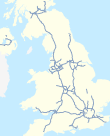A64(M) Motorway
Route
The motorway section of the ring road forms a semicircle around the north of the city centre. It is classified as a motorway to prohibit certain types of traffic and pedestrians but is not designed to modern motorway standards: it has no hard shoulders and many exits are unsuitable for a true motorway, including a right-side (fast lane) slip road exit. Most of it runs in a concrete-walled cutting, but it goes into a tunnel under the Leeds General Infirmary. The motorway cuts through inner-city neighbourhoods such as Woodhouse, Sheepscar, and Buslingthorpe, forming an important link in the road network by allowing traffic from the A65, A660, A58, A61 and A64 to bypass the city centre.
History
Leeds suffered severe traffic congestion as it was on the main route joining Liverpool, Manchester, Bradford and Hull. In 1955 it was decided to build a dual carriageway to remove through traffic. In the final stages before construction began the road was redesignated as a motorway in 1963, without any changes to the design. Construction began with the demolition of 365 homes and 174 other structures.
The motorway was built around the city centre in three stages in the 1960s and 1970s. Stage 1 opened was the route from the exit for the town hall to the A58 exit, stage 2 was the A64(M) section and stage 3 linked the road to the A58. Stages 4 to 6 featured upgrades to the A61 constructed in the 1990s to non-motorway standards featuring traffic light controlled intersections and non-grade separated junctions. When the motorway finally opened, Leeds used the motto Motorway city of the 70s.
The final stage of the inner ring road (stage 7) began construction in 2006 and opened in late 2008. Featuring a large elevated viaduct, it links the M621 at junction 4 with the previously-constructed traffic light controlled interchange at Cross Green, Leeds is of a similar standard to stages 4–6.
The remainder of the Inner Ring Road is formed by using the M621 between junctions 2 and 4 and the A643 between Elland Road and the Armley Gyratory. It is not currently signposted as a complete route on the ground other than on the motorway section to the north of the city centre.
Motorway section junctions
Note: both motorways have no junction numbers
| A64(M) motorway | ||
| Eastbound exits | Junction | Westbound exits |
| Road continues as A64 towards Seacroft The NORTH York A64 Selby (A63) |
Quarry Hill Non Motorway Traffic | |
| City Centre (M1), (M621) St James's Hospital, Bus and coach stations, Burmantofts, Harehills |
Start of motorway | |
| City Centre Loop Harrogate A61 Wetherby (A58) Moortown, Roundhay, Chapeltown, Quarry Hill |
City Centre Harrogate A61 Wetherby (A58) | |
| No exit | Skipton A660 City Centre, University, Multi Storey Car Park, Infirmary | |
| A58(M) motorway | ||
| Wetherby A58 Harrogate (A61) Sheepscar, Meanwood |
No exit | |
| Skipton A660 University Multi Storey Car Park |
No exit | |
| Civic Precinct, Infirmary | City Centre | |
| Start of motorway | Ilkley A65 Leeds/Bradford Rail Station | |
| Ilkley A65 Leeds/Bradford Rail Station Non Motorway Traffic |
Road continues as A58 to Armley (M621, M62, M1) Halifax A58 Bradford (A647) Huddersfield (A62) | |
See also
References
- ^ Leeds Construction Link – Building of the Inner Ring Road – Background
- ^ "Leeds Construction Link – Building of the Inner Ring Road – Solution". Archived from the original on 18 June 2009. Retrieved 14 October 2006.
- ^ "Leeds Construction Link – Building of the Inner Ring Road – Clearance". Archived from the original on 18 June 2009. Retrieved 14 October 2006.
- ^ The Motorway Archive – Leeds Inner Ring Road Dates Page Archived 12 March 2006 at the Wayback Machine
- ^ CBRD – Histories – Leeds Inner Ring Road – Map Archived 29 August 2008 at the Wayback Machine
- ^ "Leeds City Council Scheme Page". Archived from the original on 20 June 2009. Retrieved 14 October 2006.
